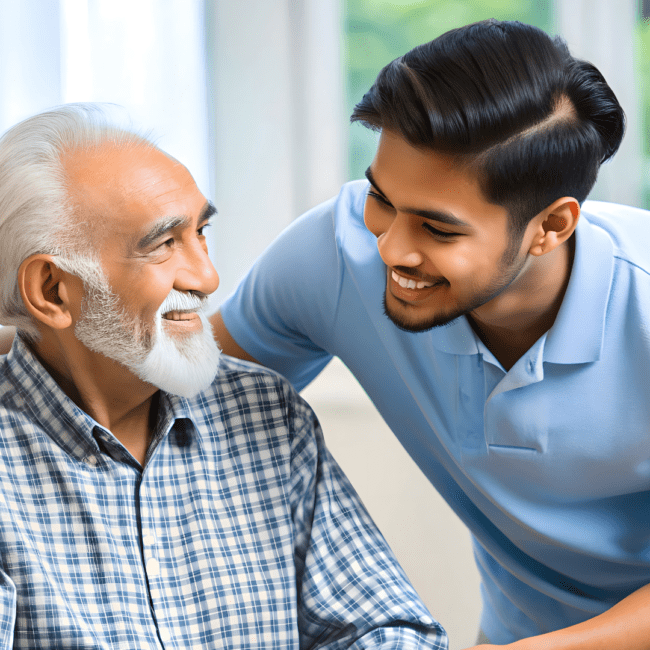Caring for a bedridden loved one is a journey filled with compassion, commitment, and challenges. From managing hygiene to preventing complications like bedsores, caregivers must juggle physical tasks, emotional support, and ongoing medical responsibilities.
Whether you’re a family caregiver or part of a professional support team, understanding how to care for bedridden elderly individuals at home is essential. This guide offers a practical roadmap to ensure comfort, dignity, and quality of life for your loved one while also supporting your well-being as a caregiver.
Understanding the Needs of Bedridden Elderly Individuals
Being confined to bed affects more than just mobility. It impacts digestion, circulation, skin health, mood, and social connection.
Key factors to monitor include:
- Skin integrity: Look for early signs of pressure ulcers or rashes.
- Mobility limitations: Even small movements matter; lack of motion can lead to stiffness and muscle atrophy.
- Mental health: Watch for signs of isolation, sadness, or confusion.
- Feeding and digestion: Reduced appetite, constipation, or trouble swallowing may need immediate attention.
- Bladder and bowel routines: Timely care helps prevent infections and discomfort.
Being alert to these concerns forms the foundation of effective bedridden patient care.
Daily Hygiene and Personal Care Routines
Maintaining cleanliness is vital in bedridden patient care to prevent infections, ensure comfort, and uphold the individual’s dignity. Regular hygiene routines, including bed baths, oral care, and clean clothing, promote physical health and contribute to a sense of well-being and self-respect for the bedridden individual.
Daily care checklist:
- Bed baths: Use warm water, gentle cleansers, and soft towels. Focus on folds and pressure points.
- Oral hygiene: Brush teeth twice daily or use mouth swabs if needed.
- Hair and nails: Dry shampoo and regular trims boost hygiene and self-esteem.
- Changing clothes and linens: Fresh clothes and clean bedsheets reduce infection risks and enhance comfort.
- Toileting needs: Use adult diapers or bedpans and clean the perineal area thoroughly.
A consistent routine builds comfort and trust, central to effective nursing care of bedridden patient.
Preventing Bedsores and Skin Issues
Bedsores, or pressure ulcers, are a common risk in bedridden patient care, caused by prolonged pressure that reduces blood flow to the skin. Without regular repositioning and proper skin care, these sores can lead to serious infections and discomfort, making prevention a top priority in daily caregiving routines.
How to prevent bedsores:
- Reposition frequently: Every 2 hours, turn the person to reduce pressure buildup.
- Use pressure-relief tools: Special mattresses, foam cushions, or air overlays.
- Keep skin dry: Moisture increases the risk of skin breakdown.
- Inspect daily: Look for redness, swelling, or skin discolouration, especially on heels, tailbone, and elbows.
- Apply barrier creams: These reduce moisture damage and prevent friction.
Early intervention is key. A proactive approach reduces hospitalisation risks and enhances comfort.
Nutritional Support and Feeding Tips
Nutrition plays a crucial role in bedridden patient care, directly impacting healing, immunity, and mood. A well-balanced diet tailored to the individual’s health conditions supports recovery, sustains energy, and improves overall quality of life. Proper feeding routines and hydration are equally important in maintaining long-term well-being.
What is an ideal diet plan for old people?
Feeding tips for bedridden elders:
- Small, frequent meals: Easier to digest and prevent bloating.
- Elevate the head while feeding: Reduces choking or aspiration risks.
- High-protein, nutrient-rich diet: Supports tissue repair and immunity.
- Hydration: Offer fluids regularly; use sippers or straws if needed.
- Monitor weight and appetite: Sudden changes can signal underlying issues.
Working with a dietician can personalise meal plans and address medical conditions like diabetes or hypertension.
Mobility and Light Exercises to Prevent Stiffness
While full mobility may not be possible, light activity is essential in bedridden patient care. Gentle exercises and movement help maintain circulation, reduce stiffness, and prevent complications like blood clots or joint contractures, contributing to better comfort and overall health.
How to improve mobility in the elderly
Safe activities for bedridden seniors include:
- Passive range-of-motion exercises: A caregiver moves the limbs to keep joints flexible.
- Hand and foot stretches: Encourage movement to prevent stiffness and swelling.
- Neck rotations and arm lifts: Help maintain some upper-body mobility.
- Bed cycling motions: Light leg movements to stimulate circulation.
Always consult a physiotherapist before starting exercises. Even short sessions improve blood flow and mental well-being.
Mental and Emotional Well-being Support
Isolation and inactivity often lead to depression and cognitive decline in bedridden patients’ care. Mental stimulation is just as vital as physical support. Engaging activities, social interaction, and emotional connection help maintain a sense of purpose, dignity, and overall well-being for bedridden seniors.
Try these engaging activities for bedridden seniors:
- Audiobooks or storytelling: Stimulate the mind and provide comfort.
- Photo albums and memory games: Keep connections with the past alive.
- Video calls and chats with family: Preserve social bonds.
- Music therapy or bhajan sessions: Uplift the spirit and calm the mind.
- Craft or colouring activities: Even limited motor skills can enjoy creative play.
A well-rounded approach ensures the person doesn’t just survive, but thrives emotionally.
Caregiver Self-Care and Support Tips
Providing nursing care for a bedridden patient takes energy, empathy, and ongoing effort. But caregiver burnout is a real risk. Regular breaks, emotional support, and sharing responsibilities are essential to sustain your well-being, because only a healthy caregiver can offer consistent, compassionate care over the long term.
How caregivers can protect their well-being:
- Accept help: Let friends, family, or homecare aides share the load.
- Stay informed: Online caregiver forums and support groups offer insights and encouragement.
- Set boundaries: Take breaks to recharge, it’s not selfish; it’s essential.
- Talk to professionals: Counsellors or therapists can help process grief, stress, or guilt.
- Use respite care: Temporary support gives you time to rest and return stronger.
Remember: a cared-for caregiver provides better care.
Conclusion
Caring for a bedridden elderly loved one is a responsibility that goes beyond just providing medical support. It demands patience, empathy, and thoughtful planning. From maintaining hygiene and preventing bedsores to ensuring emotional well-being and mental stimulation, every small detail contributes to their comfort and dignity.
Challenges may arise, but with a proactive and informed approach, you can create a supportive, respectful, and nurturing environment. This journey can feel overwhelming at times, but staying grounded and seeking the right support can make a meaningful difference for both the caregiver and the person receiving care. You’re not alone in this.
If you need expert home care or guidance tailored to your parents’ unique condition, the Samarth Elder Care team is always here to help you plan and implement high-quality support.
How to Take Care of a Bedridden Elderly at Home
Caring for a bedridden elderly person at home requires patience, structure, and medical awareness. Daily support must focus on maintaining hygiene, preventing bedsores, ensuring proper nutrition, and managing medications on time. Regular repositioning every few hours helps prevent pressure injuries, while gentle physiotherapy or passive movements can support circulation and joint flexibility. Attention to skin care, clean bedding, and a safe, well-ventilated room environment is essential. Emotional care is equally important. Talking, reading aloud, or simply sitting beside them can reduce feelings of isolation. With consistent monitoring and compassionate care, families can help bedridden seniors remain comfortable, safe, and dignified at home.
Bedridden Elder Care at Home with Samarth
Caring for a bedridden senior requires consistent medical attention, preventive care, and compassionate daily support. Samarth ensures structured assistance that prioritises safety, comfort, and dignity at home.
- Pressure Sore Prevention & Clinical Monitoring: Regular repositioning, skin care, vital checks, medication supervision, and wound management help reduce complications and support stable health.
- Feeding, Hygiene & Daily Care Support: Assistance with safe feeding, hydration, toileting, and hygiene ensures comfort while preventing infections and related risks.
- Care Manager Oversight & Family Updates: A dedicated Care Manager supervises the care plan, monitors changes in condition, and keeps families informed with timely, structured communication.
With Samarth, bedridden care is delivered with professional oversight and compassionate attention, ensuring seniors remain comfortable and respected at home.
Consult a Samarth Care Advisor
Frequently Asked Questions (FAQs)
1. How often should a bedridden elderly person be bathed?
A sponge bath or bed bath should be done at least every 2–3 days, or more often if needed for hygiene or comfort. Ensure perineal care is done daily to prevent infections and skin breakdown.
2. What happens to the body when bedridden?
Being bedridden can lead to muscle atrophy, poor circulation, constipation, pressure sores, and respiratory issues. Mental health can also decline due to isolation. Proper care can prevent or minimise many of these effects.
3. How do you keep a bedridden senior mentally active?
Use a mix of activities for bedridden seniors, like music, storytelling, puzzles, and frequent social interaction. Video calls, spiritual sessions, or even light crafting can stimulate the brain and boost emotional well-being.






